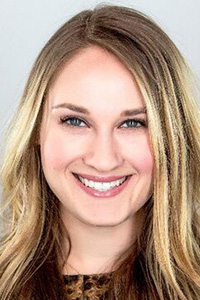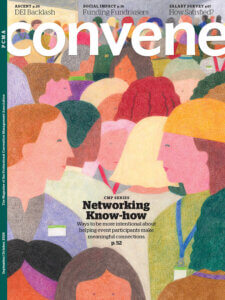
The Female Quotient hosts its signature Equality Lounges at major events like the Cannes Lions International Festival of Creativity.
In Convene’s September-October 2024 CMP Series, we explored why traditional networking methods aren’t working for women, and how a growing number of female-first spaces are trying to get it right.
One of them is The Female Quotient, known for their pop-up Equality Lounges at traditionally male-dominated, high-profile events like the World Economic Forum, Cannes Lions International Festival of Creativity, and CES.

Talia Bender Small
FQ started when Shelley Zalis, now CEO, attended the Consumer Electronics Show in 2013 and felt “tired of being an only and lonely,” so she invited other female attendees at the conference (an estimated three percent at the time) to walk the trade-show floor with her. Fifty women showed up, and a movement started.
“The second I was surrounded by women just like me, talking about work-life balance and impostor syndrome, and we also all had power of the purse — we all had money, we started doing deals with one another,” she told Event Marketer in a 2023 interview.
What keeps FQ’s Equality Lounges packed (according to CES, they plan to move the Equality Lounge to a larger space in 2025 due to demand) is keeping “genuine connections at the forefront” in creating “warm” and “inviting” Equality Lounges at events, where, said FQ President Talia Bender Small, “you’re greeted with a hug, a hello, and a yes.”
FQ’s signature Equality Lounges “focus on creating space where real connections and friendships can be formed,” Bender Small told Convene via email. “And then, of course, lead to great business opportunities.”
RELATED: Beyond the Old Boys’ Club: How Women Are Networking Their Way
While the lounges offer programming on topics “that aren’t widely discussed in other spaces, fostering thoughtful discussion and intentional action,” Bender Small said, the environment is more relaxed in nature and can “often serve as a reprieve from the hectic nature of conferences.”
Here are a few key Equality Lounge elements:
No badges — “We don’t ask people to wear badges because we want connections to be based on more than work,” Bender Small said. This is critical to the nature of the lounges, “because everyone should have the opportunity to relationship-build, engage, and be inspired, whether they’re a solo entrepreneur or mid-level employee, or the CMO.”
No cliques — Regular or returning Equality Lounge attendees, Bender Small said, are encouraged “to seek out new acquaintances and include those who may be alone in their conversations.”
Activations that encourage connecting — Equality Lounges feature headshot stations, a coffee bar — and confidence-styling offerings. “These not only serve our guests, helping them feel more prepared for the day,” Bender Small said, “but also facilitate natural connections among strangers as they wait in line or sit next to each other in the hair and makeup chair.”
Attending to women’s needs — Case in point: A dedicated area for breastfeeding mothers is part of the lounge’s design.
Jennifer N. Dienst is senior editor at Convene.
 Earn CMP Credit
Earn CMP Credit
In the following stories from Convene’s September-October CMP Series, we share how event organizers are creating innovative and flexible spaces and formats that foster meaningful connections.
You can earn one clock hour of CMP certification by visiting the CMP Series web page to answer questions about the networking articles below.
- Architects of Connection: Event Organizers Offer New Ways to Network
- Building Authentic Connections: The Human-Centric Vision of C2 Montréal
- Higher Ed, Advanced Networking
- Leaning Into Connections Is the Secret to This Event’s Success
- Designing ‘A Beautiful Nesting Ground’ for Deeper Relationships
- Event Attendees ‘Don’t Want to Waste Their Time Anymore’
The Certified Meeting Professional (CMP) is a registered trademark of the Events Industry Council.
